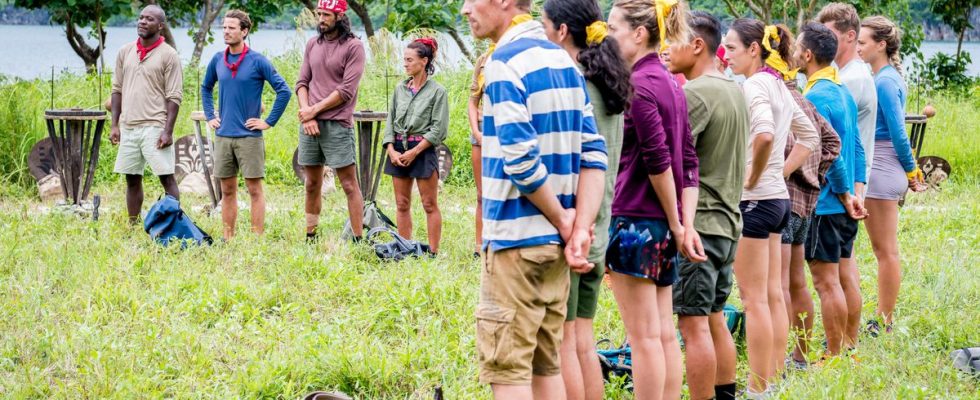“I participate in “Koh-Lanta” because I want my children to be proud of me. If we played bingo with cliché phrases from the TF1 adventure game, this one would be checked off at each episode. There are countless adventurers who play the heroic parent card every year.
Célia, first eliminated from the current season, told us that her early departure was for her “the worst possible scenario” and that she was “not worthy of (her) sons”. At the end of the line, we felt that the 49-year-old mother was not laughing: several months after the shooting, she had not recovered from her poor performance in the obstacle course. “I wanted them to be proud of me and there, it will not be the case”, she added while her two big boys of 18 and 22 years old had not yet seen the show. Célia, first eliminated from the current season told us that her early departure was for her “the worst possible scenario” and that she was “not worthy of (her) sons”. At the end of the line, we felt that the 49-year-old mother was not laughing: several months after the shooting, she had not recovered from her poor performance in the obstacle course. “I wanted them to be proud of me and there, it will not be the case,” she added when her two big boys, 18 and 22, had not yet seen the show.
“When my son found out that I was a candidate, he was crazy”
Alexandre, another adventurer of the “sacred fire”, assured us that he wanted to make his offspring proud: “When my son knew that I was going to be a candidate, he was crazy. One day when I accompanied him to school, he said to the teacher: “It’s my dad who made Koh-Lanta!”. My nieces also ask lots of questions. “Alexandre, another adventurer of the “sacred fire”, assured us that he wanted to make his offspring proud: “When my son knew that I was going to be a candidate, he was crazy. One day when I accompanied him to school, he said to the teacher: “It was my dad who made Koh Lanta !”. My nieces also ask lots of questions.”
Elodie, also involved in the current season, has no children but says she understands these parents. “We each have a reason to register for “Koh-Lanta”. Me, I wanted to prove that I was a fighter and take revenge on life. However, no one on the island was there just for their children. Basically, we all like sporting excellence, adventure, going to the end of ourselves. »
Paved in the pond: isn’t there a bit of hypocrisy in the discourse of these parents? The child psychiatrist Stephane Clerget does not really follow us on this trial of intent. “The candidates are undoubtedly partly sincere because” themselves are proud to go to “Koh-Lanta”. So they think their children, who are their extension, are too. The doctor adds a but: “It’s also a way of sweeping away any guilt. That of being absent, of having fun away from your children. But also that of harming his children. From experience, for some whose parents have done reality TV, it is not easy. In college, classmates can be mocking. The idea that parents can show off, this stardom, some of them can suffer from it between 11 and 14 years old. »
“Disappointing your child morally is a risk”
Even if they are between 21 and 30 years old, the children of Christine, another adventurer of the current season of “Koh-Lanta” had confided their concerns to him. “They were afraid to know how I was going to be perceived and wondered about the fallout, says the forties. They are reassured because it turns out that it is only positive. »
It is true that while TF1’s flagship program fully plays the card of heroism and adventure, globally positive values, it is also conducive to petty remarks, twisted strategies, betrayals… “Certain sequences are not not always to the benefit of the candidate who may feel ridiculous or devalued, continues Stephane Clerget. Disappointing your child morally is also a risk – but you can also be disappointing at home. »
How then, to manage the shame that one can inspire in his little one? “The risk can be modulated if we explain to him that it is a program where we play a role, that it is like a fiction, he answers. Today, the youngest have a good understanding of the notions of scenarios and the requirements of the audiovisual industry. They can hear that a character is being played. It is more annoying with classmates, especially at college level, who may criticize the child. There, it will be harder to defend yourself. »
“A different look at parents”
However, for the author of ypersensibles, hyperamoureux published by La Musardine editions, there is nothing to refrain from going rough in the middle of the Pacific Ocean in front of the TF1 cameras to protect the little one. last. On the contrary.However, for the author of Hypersensitive, hyperamorous published by La Musardine editions, there is no reason not to trudge the hard way in the middle of the Pacific Ocean in front of the TF1 cameras to protect the youngest. On the contrary.
“It’s interesting for children to observe their parents in a context other than that of the home, to see them in their social life, in the street and, why not, on a TV show. This gives them another look: their parents are not only that but also people who love, have fun, play sports. Today, we are so on the back of our children, we feel so guilty for never doing enough for them, that it is a good thing for the child to tell himself that he is not 100% the center of interest of his parents. This pushes him to look elsewhere than around his navel. »

